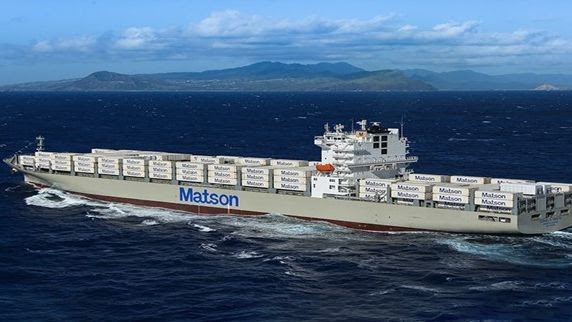Kongsberg Maritime will supply a comprehensive range of integrated technologies to optimise energy use and reduce emissions for three new 3600 TEU LNG-powered container ships being built at Philly Shipyard for Matson Navigation Company. They are the largest Jones Act containerships ever built, at 260 metres long, and represent a new era in container shipping.
To support Matson’s drive to decarbonise its operations, Kongsberg Maritime will supply hybrid electrical systems, controlled and operated by the company’s Energy Management System.
The new ships are being built to operate Matson’s China-Long Beach Express (CLX) service. The Aloha Class vessels are the largest containerships ever built in the U.S. and are designed to operate at speeds in excess of 23 knots in support of Matson’s service hallmark – timely delivery of goods.
The Kongsberg Maritime scope of supply includes a Shaft Generator System, and a Battery Energy Saving System combined with a complete power management system. The hybrid electrical systems will provide electrical power to the vessel’s main switchboard through the Kongsberg converters.
Lasse Brynsrud, Kongsberg Maritime, Senior Sales Manager Marine Transportation, said: “Through their investment in three new LNG-powered container ships, Matson Navigation Company is making a clear commitment to decarbonise its operations. Kongsberg Maritime is delighted to be supporting their environmental goals through the supply of a wide range of green ship technologies, including our hybrid electrical system, which together will optimise energy usage and reduce emissions.”
“Our existing Aloha Class ships are among the fastest, most efficient vessels in the Matson fleet,” said Capt. Jack Sullivan, Matson’s senior vice president, Vessel Operations & Engineering. “We expect these new Jones Act compliant vessels to help Matson achieve its 2030 greenhouse gas emissions reduction goal while also providing additional capacity and speed benefitting our Hawaii service as well as our China-Long Beach Express service. The integrated systems from Kongsberg Maritime will enable us to make the most efficient use of energy on board, including power generated from the main shaft and the battery system, which provide additional emission-free energy in peak load conditions.”
“We are thrilled to collaborate with Kongsberg and Matson to implement green ship technologies today that will help the industry move toward a more sustainable maritime future,” said Steinar Nerbovik, Philly Shipyard President and CEO. “As the shipbuilder, we are always prepared to build ships that support the goals of our customers and will partner with the right suppliers to unite sustainability efforts.”
Kongsberg Maritime will also supply rotary vane steering gear and control systems, together with a full package of monitoring, automation and control systems for the LNG fuel gas supply control and safety systems, tank gauging and instrumentation.
All systems on this extensive package, including the vessels’ propulsion control and power management, will all be linked to the K-Chief Integrated Automation System from Kongsberg.
Source: Kongsberg Maritime.
Tags: Emissions, Hybrid Technology, Kongsberg Maritime



Recent Posts
Egypt Advances Maritime Decarbonisation with National Action Plan Backed by IMO
Fuelre4m unveils VIRDIS: A predictive AI breakthrough in global fuel distribution, powered by Five9nes
EXMAR Launches First Ammonia-Fueled Gas Carrier at HD Hyundai Mipo
Japan-Backed Green Hydrogen Centre Planned for Uttar Pradesh
JSW Group Outlines Major Push into Commercial and Heavy Electric Vehicles
Lloyd’s Register Grants Approval in Principle for KSOE’s Multi-Fuel Newcastlemax Bulk Carrier Design
Eureka Shipping Deploys HVO-Ready Cement Carrier Tamarack for Great Lakes Operations
Terntank Places Repeat Order for VentoFoil Wind Propulsion Units on Methanol-Ready Hybrid Tankers